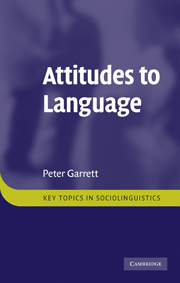Book contents
- Frontmatter
- Contents
- List of figures
- List of tables
- Acknowledgements
- 1 Introduction
- 2 Fundamentals of language attitudes
- 3 Main approaches to the study of language attitudes
- 4 Matched and verbal guise studies: focus on English
- 5 Matched and verbal guise research in more contexts
- 6 Attitudes to speech styles and other variables: communication features, speakers, hearers and contexts
- 7 Communication accommodation theory
- 8 Language attitudes in professional contexts
- 9 Societal treatment studies
- 10 Direct approach
- 11 Folklinguistics
- 12 An integrated programme of language attitudes research
- 13 Conclusion
- Glossary
- References
- Index
- References
2 - Fundamentals of language attitudes
Published online by Cambridge University Press: 05 June 2012
- Frontmatter
- Contents
- List of figures
- List of tables
- Acknowledgements
- 1 Introduction
- 2 Fundamentals of language attitudes
- 3 Main approaches to the study of language attitudes
- 4 Matched and verbal guise studies: focus on English
- 5 Matched and verbal guise research in more contexts
- 6 Attitudes to speech styles and other variables: communication features, speakers, hearers and contexts
- 7 Communication accommodation theory
- 8 Language attitudes in professional contexts
- 9 Societal treatment studies
- 10 Direct approach
- 11 Folklinguistics
- 12 An integrated programme of language attitudes research
- 13 Conclusion
- Glossary
- References
- Index
- References
Summary
This chapter covers some of the fundamental issues around attitudes, such as their constitution, origins, functions, qualities of stability and change, and their relation to stereotypes and ideology. Inevitably, these basic aspects tend to concern attitudes generally, rather than language attitudes specifically.
DEFINING ATTITUDE
In early work on attitudes, Allport (1935: 801) claimed that attitude was the most indispensable concept in social psychology, and it has been a core concept in sociolinguistics since Labov's (1966) seminal work on the social stratification of speech communities, and how language change is influenced by the prestige and stigma afforded by speech communities to specific linguistic features. The concept of attitude, however, is not easily defined. Definitions vary in their degree of elaboration and in the weighting given to different features of attitudes.
To take one or two examples, Thurstone (1931) defined an attitude as ‘affect for or against a psychological object’, emphasising the positive and negative emotional responses that attitudes embody. A well-cited definition was given by Allport (1954): ‘a learned disposition to think, feel and behave toward a person (or object) in a particular way’. This one, then, highlights that attitudes concern more than affect alone, and extend to thought and behaviour too.
- Type
- Chapter
- Information
- Attitudes to Language , pp. 19 - 36Publisher: Cambridge University PressPrint publication year: 2010
References
- 1
- Cited by



